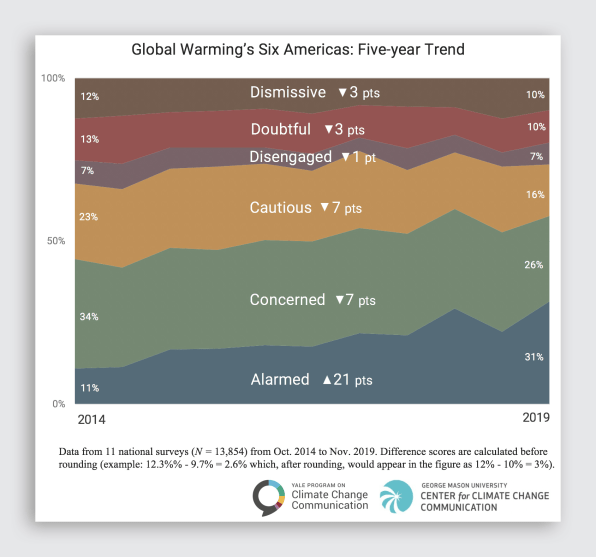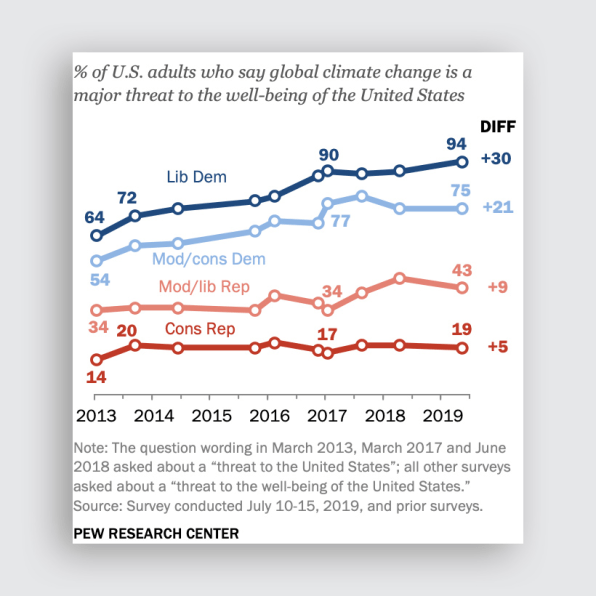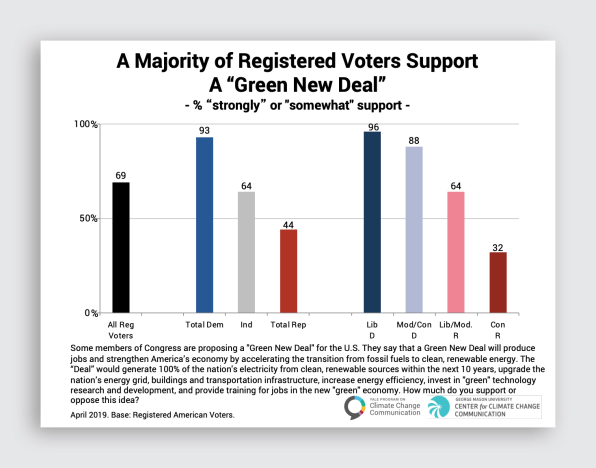Progressive politicians’ push for climate action is making Republicans rethink their denial
The last few years have seen a stunning shift in the way Americans think about climate change, which has gone from a marginal concern—one scarcely mentioned in the run-up to the 2016 election—to a leading issue.
The primary reason is that progressive elected officials and activists have made a bold tactical shift in the way they approach the issue. While Democrats once lent their support to fossil fuels in the hope of forging consensus with Republicans, the new generation of climate leaders has made clear that global warming is an existential threat and is pushing for transformative policy to end the use of coal, oil, and natural gas.
Not only have young, dynamic climate champions such as Representative Alexandria Ocasio-Cortez (a New York Democrat) reshaped public opinion, they have also managed the impossible—getting Republicans to change their rhetoric on climate change. President Trump, who famously called climate change a Chinese hoax, recently said, “Nothing’s a hoax about that. It’s a very serious subject.” And in his 2020 State of the Union address, he called for planting a trillion trees to protect the environment, a key provision of a new GOP climate proposal.
Public opinion has shifted on climate change. Progressives get a lot of the credit.
Researchers at Yale and George Mason University have divided Americans into six segments according to their views on climate change, ranging from the “Dismissive,” who are hard-core deniers, to the “Alarmed”—the climate hawks. Five years ago, the Dismissive outnumbered the Alarmed. Today, the Alarmed account for the largest slice of the public, almost a third of all Americans.

[Image: Yale/GMU]
Voters who were previously lukewarm on global warming are now worried. Climate change ranks as the number one or two issue among all Democrats, and it consistently takes the top spot among liberal Democrats—those most likely to vote, donate, or contact an elected official. And it’s not just Democrats who are fretting about the climate. Republicans have also grown more worried. Young Republicans, in particular, are concerned about rising temperatures.

Why is this happening? Worsening hurricanes, droughts, and wildfires may be a factor, but experts say that extreme weather has only a small, and typically short-lived, impact on attitudes toward climate change. Changing views could also be a function of the economy, as Americans tend to worry more about the environment when unemployment is down, and currently the jobless rate is at a 50-year low.
…and we have #GreenNewDeal lift-off! ????????
Never underestimate the power of public imagination. pic.twitter.com/h4PqqPucEX
— Alexandria Ocasio-Cortez (@AOC) December 14, 2018
But when social scientists compared the various forces shaping views of climate change, they found that it is advocates and political leaders who are doing most to influence public opinion, primarily by driving news coverage of the issue. In recent years, progressive Democrats such as Bernie Sanders (a Democrat from Vermont), Jay Inslee (a Democrat from Washington), and Alexandria Ocasio-Cortez, flanked by activists such as the Sunrise Movement, Extinction Rebellion, and, most visibly, Greta Thunberg have spoken frankly and honestly about the dangers of climate change and the need for dramatic action. In doing so, they have pushed news outlets to report on the problem, changing the national conversation.
Americans are worried about climate change, and they don’t trust Republicans to do anything about it.
In addition to stirring public concern, progressives have also scored points for Democrats. Where the environmental left previously tried to win over Republicans by offering up conservative-friendly climate policies, such as cap-and-trade, the new generation of climate leaders is trying to beat Republicans, putting forward an unapologetically progressive plan in the Green New Deal, one that speaks to the true scale of the crisis. The proposal is broadly popular, and it serves as a testament to the fact that Democrats take the issue seriously.
Today, Democrats enjoy a massive advantage over Republicans on climate change. Americans trust Democrats on climate and the environment more than they trust either party on any other issue, surveys show. In a damning indictment of the GOP, some 63% of Americans say the Republican Party is “outside the mainstream” on climate change. On no other issue do so many people think either party is outside the mainstream.
Even among voters who approve of his job performance, Trump gets lower marks on climate change than on any other issue. This is the political cost of years of climate denial. Now Republicans are sprinting to make up lost ground.

[Image: Yale/GMU]
Republicans are changing the way they talk about climate change—if little else.
Climate change is a liability for Republicans, who understand their stance is a loser with young voters. As former GOP strategist Douglas Heye told The New York Times, “This spells certain doom in the long term if there isn’t a plan to admit reality and have legislative prescriptions for it.”
So Republicans are tweaking their rhetoric, even if their policies remain largely unchanged. Trump admitted that climate change is not actually a hoax shortly after announcing plans to curtail environmental protections. He followed up by saying, without a touch of irony, “Somebody wrote a book that I’m an environmentalist and actually called, ‘The Environmentalist.’”
With progressives pushing for a Green New Deal, and House Democrats recently unveiling their own climate proposal, Republicans have been scrambling for some kind of response. GOP House members recently put together a plan that calls for planting trees, supporting carbon capture, investing in clean energy research, and giving tax breaks to companies that export clean energy technology. Ironically, the policy package has been touted by Breitbart and Fox News, two outlets with a rich history of climate change denial.
Parts of the plan are praiseworthy—planting trees is always good—but the GOP proposal sets no targets for cutting pollution, and it treats natural gas, a fossil fuel, as clean energy—which is laughable. There is no way to keep warming in check without rapidly phasing out the use of fossil fuels. But Republicans have to say something. Even the oil industry is claiming to be fighting climate change.
But make no mistake, the fact that the GOP has stitched together a climate plan doesn’t mean it has had an epiphany about the carbon crisis. It means that it has become politically toxic to continue to deny the problem. Progressive political leaders and activists are flexing. Public opinion is shifting. And the GOP is responding. If Democrats are smart, they’ll press their advantage.
Jeremy Deaton writes for Nexus Media, a nonprofit climate change news service. You can follow him @deaton_jeremy.
Fast Company , Read Full Story
(38)



